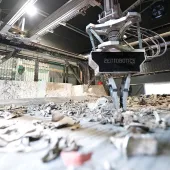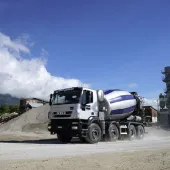Another tunnel success for LafargeHolcim

Company plays key role in construction of Gotthard Base Tunnel – the world’s longest railway tunnel
WITH the official opening of the world’s longest railway tunnel – the 57km Gotthard Base Tunnel in Switzerland – on 1 June 2016, another major infrastructure project has been added to the numerous tunnel construction projects in which LafargeHolcim have played a role around the world.
The new railway link through the Alps, including the Gotthard and the Ceneri base tunnels, is a Swiss centennial project and one of the largest environmental protection projects in Europe.
Moving some of the passenger and freight transport from road to rail is expected to save environmental costs of CHF130 million each year and the time it takes to travel between Zurich and Milan, and many other destinations north and south of the Alps, will be reduced by an hour.
For LafargeHolcim, who are the construction materials and logistics partner for both tunnel projects, environmental concerns were a priority right from the start.
The excavated material was transported in an environmentally friendly manner, via conveyor belts, for a distance of 70km. The total amount of excavated material weighed 28.2 million tonnes and LafargeHolcim were able to recycle more than one third of this amount into aggregates for use in the manufacture of concrete used in the tunnels’ construction.
The remaining material was reused for many different purposes, including the natural landscaping of the access routes leading to the tunnel.
Involved in the project from the beginning, Holcim Switzerland, began their research to find the right concrete/cement mix and application methods in 1996 with numerous cement formulae and applications being tested in a test gallery to take into account the characteristics of the rock to which it would be applied.
Logistics were also a factor. Owing to the long journey to reach the tunnel, the ready-mixed concrete needed to remain in a liquid state for 12 hours. A specially developed concrete train with a mobile concrete mixing unit and a tailor-made ready-mixed concrete unit within the tunnel both played a critical role in ensuring the concrete was delivered in perfect condition.
The Group also invested in building the most modern cement plant in Switzerland and connecting it to the railway infrastructure, as well as the operation of 400 cargo-carrying rail cars. These investments guaranteed that the Group would be able to create up to 2,300 cubic meters of concrete every day when working around the clock, without interruption, at peak construction times.
Once the Ceneri Base Tunnel is completed in 2020, LafargeHolcim will have supplied 2.3 million cubic meters of ready-mixed concrete and 1 million tonnes of cement to the project.









